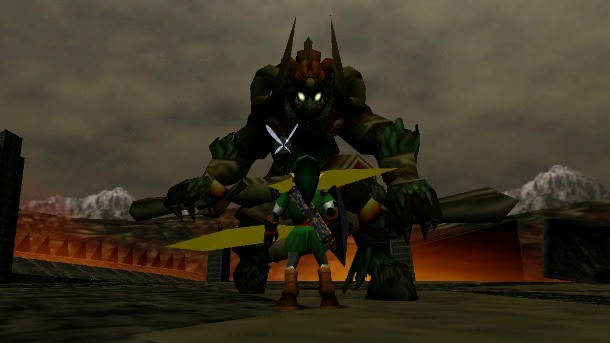Please support Game Informer. Print magazine subscriptions are less than $2 per issue
What Makes A Game Ending Memorable?

Memory is a tricky thing. Some memories we look back on more fondly than we should. On occasion, we might have had a lot of fun at the time, but in retrospect we may regret that memory. In video games, it usually takes an exceptional game to stand out. It helps even more if that game’s ending was memorable. Having a great ending almost always creates a lasting memory of a game.
A strong ending manifests in two ways: either there was a strong narrative closure, or there was a great gameplay sequence at the end. In some cases, a game has both, but that’s very rare. A rock solid ending can be seen in two games known not only for being great, but having great endings. Obviously, these games will be spoiled if you have not completed them, so fair warning as always.
Closure – Red Dead Redemption
Red Dead Redemption is a game known for having excellent gameplay, but it is the way the story wraps up that really makes it shine. The creators took a gutsy approach by killing off the main character. John Marston is killed by Edgar Ross and his men – the same people who had Marston doing their dirty work the entire game to become a free man. Ross betrayed Marston and killed him, and the game puts you in his son’s shoes for the final sequence. You take over as John’s son Jack when he becomes an adult. For a while it seems there is nothing to do until you ride into town and see that there is a well-dressed man to talk to. Jack asks him about Ross’s whereabouts, and the man tells him that Ross has retired into a comfortable lifestyle down by Lake Don Julio.
The buildup is what makes the payoff so strong. It is a long ride to Lake Don Julio, where you find Ross’s wife worrying about her husband, calling him, “such a sensitive man.” Any player who has played up to this point knows nothing could be further from the truth, which only builds up one’s desire for justice. Ross is not at the Lake, he is down hunting by the river. The buildup continues as you come to the river and talk to his brother. Ross’s brother finally leads Jack to the man himself, hunting duck in the river. Ross cockily defends his actions to Jack, making him even more reprehensible. The game then lets you shoot Ross in a duel, at which point Ross gets lit up by bullets and flops into the river. Jack turns around slowly, and the title card satisfyingly appears on screen in red and white. The entire story led up to a moment that is a manifestation of the title: redemption, in a bloody and final fashion.
The strength of the ending and Red Dead Redemption as a whole is that it knows what it’s about. It does not preach morality or try to weave heady topics into a convoluted storyline. It is a story about struggle, violence, and revenge. The game already had great gameplay and was well told, but it’s the perfect ending that makes me look back on it with reverence.

Climax – The Legend of Zelda: Ocarina of Time
Many people regard Ocarina of Time as one of the greatest games of all time, but not often enough is it articulated why. One thing that certainly makes a strong argument is an ending gameplay sequence that is worthy of the epic adventure preceding it. The narrative aspect of Ocarina of Time’s ending is well told but predictable. Guess what? Link saves Zelda.
The ending sequence is anything but predictable. Link climbs the final tower, opens the doors at the top to find Ganondorf playing ominous organ music with Zelda trapped in a pink crystal overhead. What follows is a boss battle where you must deflect Ganondorf’s energy back at him with a Master Sword and then shoot him with light arrows. Eventually the big baddie topples, and it seems like a fairly standard way for the game to end.
Ocarina of Time has a few more tricks up its sleeve. The tower begins crumbling and Link and Zelda must make a tense escape. Along the way down you have to take out enemies quickly since you only have three minutes before the tower collapses. With haste, the two of them make it outside, where Ganondorf makes one final stand. Emerging from the ruins of his castle with one final burst of energy, Ganondorf transforms into a towering beast.
Ganon knocks away your trusted Master Sword immediately. The game smartly forces improvisation, and tasks you to use arrows, bombs, or whatever else you have to win. After Ganon takes enough hits, he finally kneels in agony, at which point Link fittingly grabs the Master Sword and finishes him off.
It is the intricacy and the multiple facets to the gameplay of this ending sequence that makes it so memorable. To have a three part final boss battle is ambitious, and the Zelda team pulled it off admirably. It goes to show that even if you can predict the ending, it can still be outstanding.
Memorable moments often happen if they’re original. Ocarina of Time has originality in its final gameplay sequence, and Red Dead Redemption does an original job with its storytelling. If either the narrative is tied up nicely or the final gameplay is spectacular, it can make up for a game’s shortcomings. And if that game is already great, a rock solid ending will only strengthen the memories of good times you had with the game.
For more, check out Kimberly Wallace’s in-depth piece on endings, as well as Kyle Hilliard's piece on the ending of Dead Space 2.










